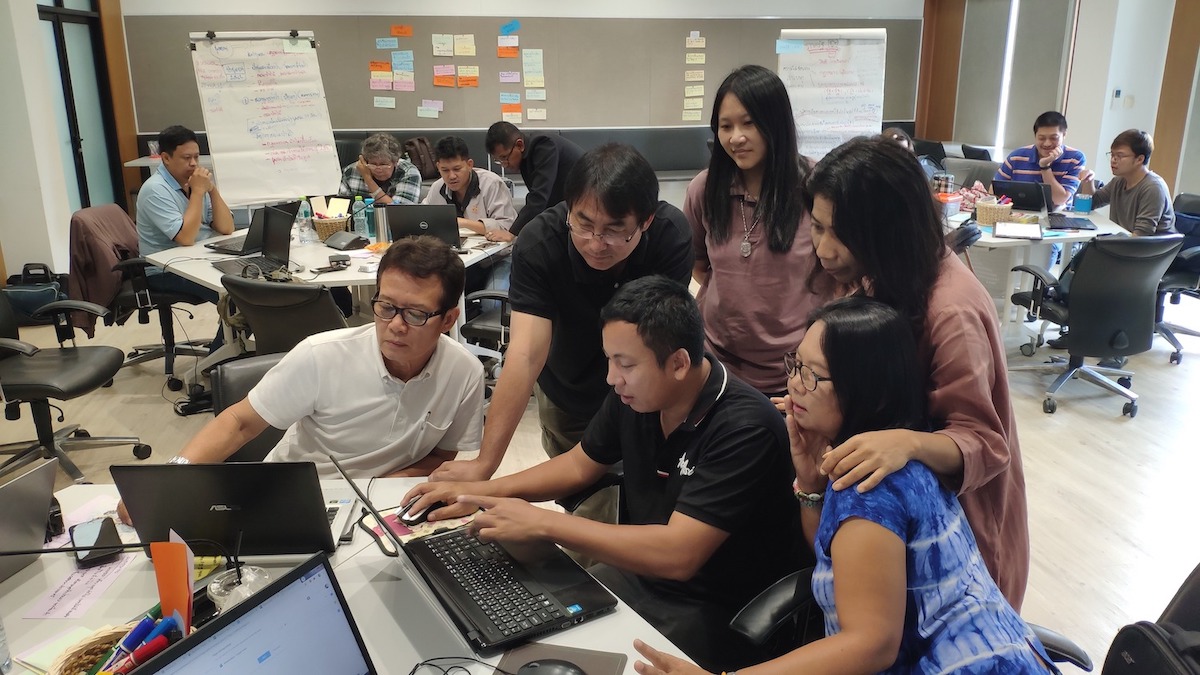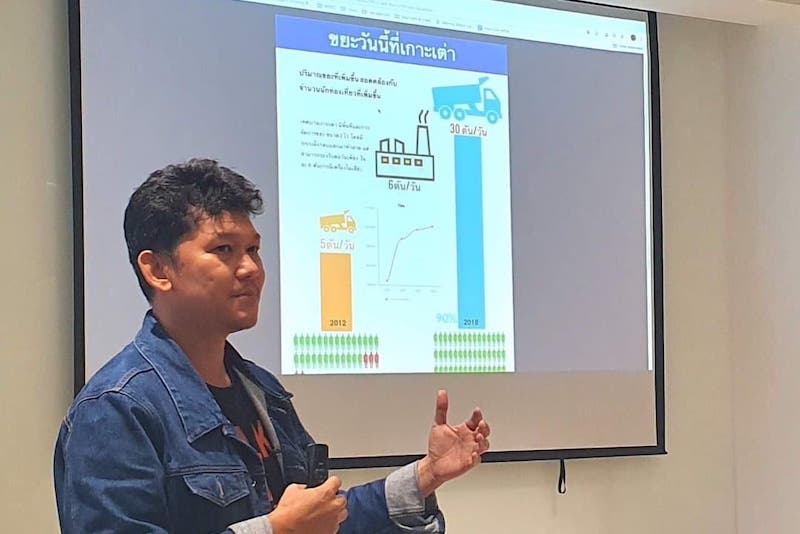Thai foresters complete data literacy training to advocate for improved forest governance
Liwan Srisutayakhun from Chumphon Province’s Pa Rak Nam Network (Forest Loves Water Network) had never created data visualisations before. This is why she joined 11 other participants from Thailand’s civil society to complete East-West Management Institute’s (EWMI) data literacy training program from February to June 2020. By the end of the program, Liwan had developed her first data-driven presentation depicting land ownership rights in Bang Mak Sub-district.
EWMI’s data literacy training is adapted from the World Bank’s Data Literacy Certificate Program and can be tailored to the needs of different audiences. Regardless of the sector, all participants are trained in reading, understanding, and communicating with data and insights derived from it. This training in Thailand was tailored for participants from the forestry sector. They included representatives from Baan Non Toom Thaworn Community Forest, Self-organized Land Reform Network, Citizen Forest Network, Chiang Mai Community Organisation Council, Raks Thai Foundation, RECOFTC Thailand, and Western Community Radio Network.

Participants were very supportive of each other during the training. (This photo was taken during the first phase in February 2020.) Photo by EWMI-ODI under CC BY-SA 4.0.
Liwan had collected spatial data about Bang Mak Sub-district’s Moo 9 community members who have different land use certificates indicating rights for housing, occupation, and use of public lands for palm and/or coconut plantations. These certificates, such as Nor Sor Lor, Nor Sor 3 Gor, Nor Sor 3, and Sor Kor 1, have differing rights and were issued by provincial land officers as evidence for landowners. It is possible to upgrade the certificates to full title deeds (or Chanote). Using this data, Liwan developed a story titled Forest-dependent Community Rights of Village Moo 9, Bang Mak Sub-district, Mueang District, Chumphon Province. After her data analysis, she found that 45.5 percent of landowners are female, and 92 percent of community members do not have full land rights under Nor Sor Lor. These insights showed how data can be used to protect rights and gain access to public services.
“I did not know about this kind of data analysis and presentation,” said Liwan. “Attending this course, I find it very useful to transfer our collected data into insights.”
Liwan left the course feeling inspired.
“I wish to continue working with data of an entire community to raise awareness for access to public services and increase community participation to protect their rights,” said Liwan.
She plans to use her new skills to gain data insights into female land ownership and support her funding request by presenting a data visualisation at the Annual Sub-district Community Council Meeting.
RECOFTC Thailand’s project officer Arpaporn Thongsangiam already had built skills in collecting, organizing and presenting data before attending the training. But she had not yet produced a data visualisation. Using data on timber markets, Arpaporn wanted to visualise and communicate data insights to the citizen forest network in order to clarify the rights of smallholders to grow and sell their timber. During the training, she produced a data dashboard on Timber Harvesting Information of Mae Tha Sub-district, Mae On District, Chiang Mai Province. The dashboard shows timber harvesting information classified by timber size from the seven villages in Mae Tha Sub-district. (See dashboard below.)
Like Liwan, Arpaporn left inspired by the opportunity to exchange ideas and receive feedback from fellow participants on how to improve data-driven presentations.
“Several data management techniques and visualisation tools introduced in the training are inspirations for impactful presentations and useful practice,” said Arpaporn.
She plans to use her new data visualisation skills to improve her reports, which normally present data in tables.
Participants’ exposure to data prior to the training varied. For Seksan Chanthavorn, a field coordinator at Raks Thai Foundation from Ranong Province, the program offered him an opportunity to learn about new tools such as Datawrapper, Tableau and Google Sheets. Previously, his main visual enhancers were only flipcharts and PowerPoint slides.
“First and foremost, this program provides new knowledge and experience,” said Seksan. “I learned that there are a lot of data sources that we have not accessed, both online and offline. My takeaway message is: Do research to get data and trust that data is available somewhere. Do not give up if you have not found it.”
By the end of the training, Seksan produced a data-driven story titled, Marine Waste Management of Koh Tao, Suratthani Province. It describes Koh Tao as a popular tourist destination, but reveals the reality of an accumulating waste problem exacerbated by insufficient funding and ineffective waste management. In particular, Seksan’s data analysis shows why Koh Tao’s single dumpsite was insufficient: waste dumped per day has tremendously increased by six times over six years.
Seksan will present this data story to Koh Tao Municipality to engage civil society participation in the drafting of a new municipal law on waste management.
“This training acts as my rehearsal opportunity for preparing data visualization and presentation of my work in Koh Tao, under the UNDP’s Global Biodiversity Finance Initiative (BIOFIN),” said Seksan.
Seksan also felt motivated to start his blog on Medium and use the storytelling techniques he learned alongside the data visualisation.

Seksan Chanthavorn from Raks Thai Foundation presents his data visualisation. Photo by EWMI-ODI under CC BY-SA 4.0.
This six-module course is normally completed over three months. The COVID-19 pandemic delayed completion of the course, which began in February at the RECOFTC office. EWMI has completed its tailored data literacy training course in Myanmar and Cambodia. A similar program for forest non-state actors and civil society members in Viet Nam recently began in July 2020.
All participants in Thailand clearly recognised the importance of data literacy, but they all came in with different skill levels. Despite this, all felt that the course had something to offer them. This highlights the benefits of a training course tailored to its audience in terms of skill level, dataset sources and language.
This program was delivered at an important moment for Thai civil society. Thailand’s government is currently negotiating a Voluntary Partnership Agreement (VPA) with the European Union. VPAs are an important component to the EU Forest Law Enforcement, Governance and Trade (FLEGT) Action Plan to address illegal logging. It is important that stakeholders such as non-state actors and civil society organisations are able to better advocate in this process through the presentation of a compelling data story to advance forest governance. This program provided civil society and non-state actors with tools to further their advocacy.
All participants were sponsored by the Voices for Mekong Forests (V4MF) project, a five-year initiative funded by the EU. V4MF aims to strengthen the voices of civil society, Indigenous Peoples, private sector and local community groups to engage in and influence forest governance in Cambodia, Lao PDR, Myanmar, Thailand and Viet Nam. The project supports the EU’s FLEGT initiative and the United Nations’ Reducing Emissions from Deforestation and forest Degradation (REDD+) initiative.
“Attending this course, I find it very useful to transfer our collected data into insights.”
— Liwan Srisutayakhun, Chumphon Province’s Pa Rak Nam Network
“Several data management techniques and visualisation tools introduced in the training are inspirations for impactful presentations and useful practice.”
— Arpaporn Thongsangiam, project officer at RECOFTC Thailand
“I learned that there are a lot of data sources that we have not accessed, both online and offline. My takeaway message is: Do research to get data and trust that data is available somewhere. Do not give up if you have not found it.”
— Seksan Chanthavorn, field coordinator at Raks Thai Foundation
Story by Saowalak Jingjungvisut (Aey), the partnerships and communication manager at East-West Management Institute (EWMI). Special thanks to communications team and editors supporting the story editing.
This story is produced with the financial support of the European Union. Its content is the sole responsibility of the Open Development Initiative and RECOFTC and it does not necessarily reflect the views of the European Union. To find out more about this and other activities under the EU-funded Voices for Mekong Forests, visit the project page.
Open Development Initiative (ODI), a project of East-West Management Institute (EWMI), stimulates public demand, builds coalitions, and offers a constantly evolving platform to support the transparent sharing and analysis of data to improve and inform constructive dialogue and decision making for sustainable and equitable development.
RECOFTC’s work is made possible with the continuous support of the Swiss Agency for Development and Cooperation (SDC) and the Swedish International Development Cooperation Agency (Sida).
Saowalak Jingjungvisut

